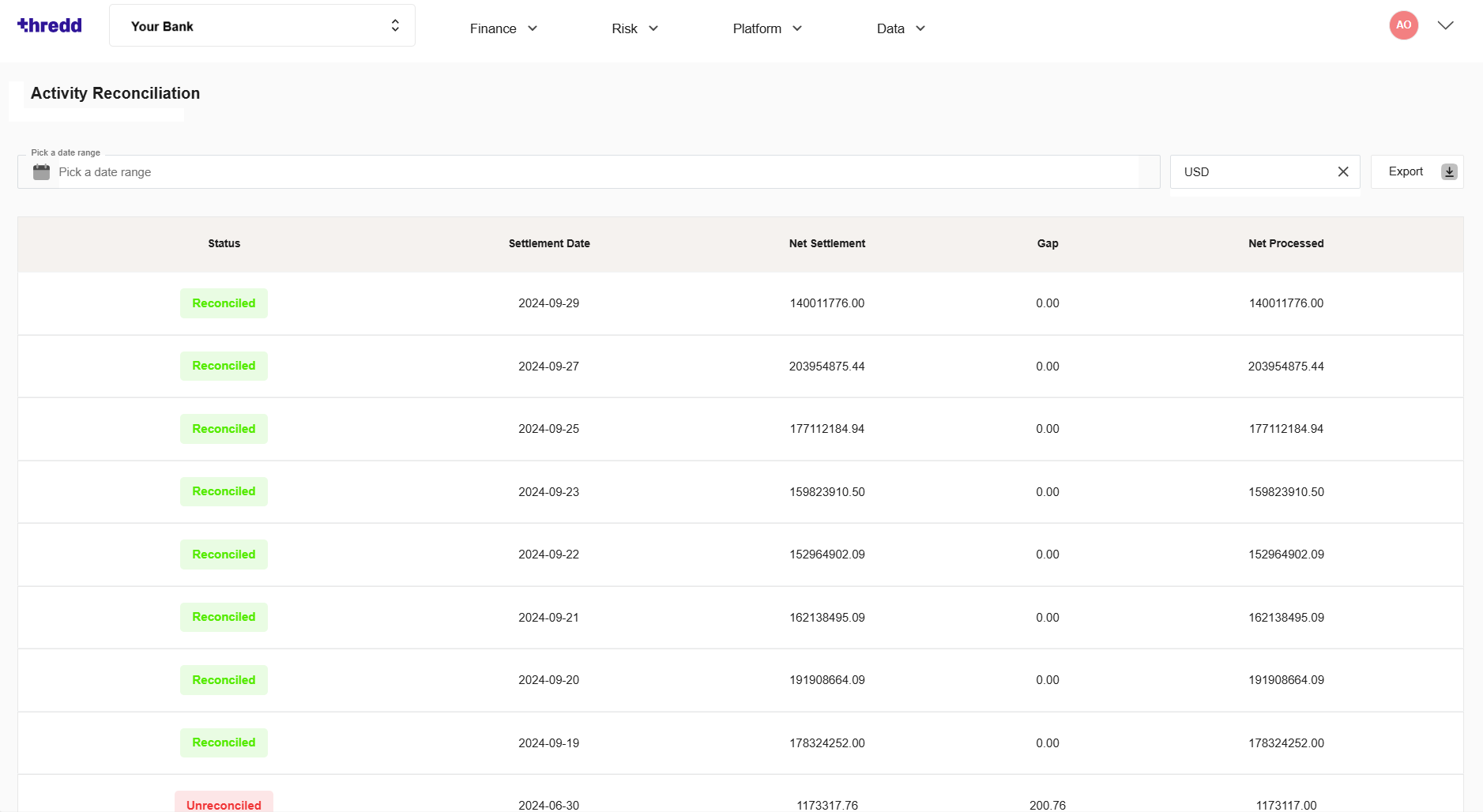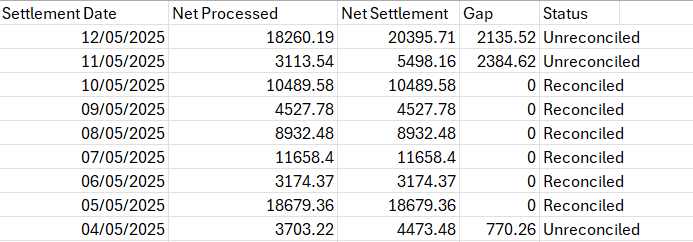Using Activity Reconciliation
This section explains how to view reconciliation records and use the reconciliation options. There are options available for filtering records by date and currency and exporting your reconciliation records to a CSV file. Reconciliation information is provided at different levels of detail, enabling you to drill down from high-level daily summary information to more detailed transaction information:
-
View a summary of daily reconciliation status — where the daily settlement records are compared. The Scheme net amount settled is matched to the net amount processed by Thredd. See Viewing Activity Reconciliation Status.
-
Drill down to view details for a daily settlement record — with amounts broken down into transaction amounts and network fee amounts. You can view the list of transactions for that day, and their matching status. You can also view the daily Card Scheme T140 or VSS files at this level. See Viewing Activity Reconciliation Records.
-
Drill down to view further transaction details — view the transaction matching status for the specified day or date range. See Transaction Matching.
-
Drill down to view the data of the underlying transaction lifecycle — including details of the fields that have been matched. See Viewing the Transaction Lifecycle.
Viewing Activity Reconciliation Status
-
Log in to your account at: https://backoffice.thredd.com/login/
-
Select Finance > Transaction Reconciliation > Activity Reconciliation from the menu.
The Activity Reconciliation page displays each day's reconciliation status, based on the net transaction amounts processed and settled for that day. See the example below.

Figure 12: Activity Reconciliation Page
The net transaction settlement amount for each day is compared using the settlement data obtained from the Card Scheme (Net Settlement column), which is matched with your Thredd transaction data (Net Processed column).
-
If the totals match, the day's record is listed as Reconciled. The amount in the Gap column is listed as zero.
-
If the totals do not match, the status is reported as Unreconciled. The amount in the Gap column lists the difference in amounts between the Net Settlement and Net Processed columns.
What to do if the record status is Unreconciled?
Unreconciled records may indicate an issue with the transaction records. In this case, we recommend you click the record to view further details of the matched and unmatched transactions.
Viewing Record Details
-
You can click a row to view a further breakdown of details for that record. For more information, see Viewing Activity Reconciliation Records.
Browse between Pages
-
You can use the numbered buttons and arrows at the bottom of the page to browse between pages.

Filtering Records
-
You can use the date and currency filter options to refine the list of records displayed.
Filtering by Date Range
To filter by date range:
-
Click in the Pick a date range field.
-
In the Date Range Picker pop-up window, use the calendar back and forward browse arrows to find the required start date, and click the date.
-
To select multiple dates, press the shift key on your keyboard, browse to the required end date and click the date.
The screen displays records that match your specified date range. See the example below. -
To clear the date filter, click the Clear button (X icon displayed on the right of the Pick a date range field).

Figure 13: Activity Reconciliation Screen - showing the Date Range Picker
Filtering by Currency
-
To filter records by currency, enter the three-digit currency code into the Currency field.
-
To clear the currency filter, click the X button (displayed on the right of the Currency field).
Viewing Activity Reconciliation Records
This section explains how to drill down to view details of a reconciliation record.
-
Go to the Activity Reconciliation page and use the filters to view reconciliation records, as described in Viewing Reconciliation Status.
-
To view a breakdown of details for a record on the Activity Recon page, click the row you want to view.
The record details are displayed below the record. See the example below.

Figure 14: Daily Reconciliation Record Details - showing the Network Fees tab
The following record details are available:
Network Fees
The Network Fees tab shows the Card Scheme charges credited to or debited to your Issuer account for that record. These are based on the details in the daily Card Scheme invoices.
|
Field |
Description |
|---|---|
|
Total Debit |
The total Scheme fees debited from your Issuer account. |
|
Total Credit |
The total Scheme fees credited to your Issuer account. |
|
Net Amount |
The net amount paid to the Scheme. A negative amount indicates fees paid to the Card Scheme. A positive amount indicates fees paid to your Issuer account. |
|
EDP |
The daily interchange adjustment done by Mastercard. This field is not relevant for Visa. |
Transactions
The Transaction tab shows a summary of the number of transactions and spend volume for per matched and unmatched transactions.

Figure 15: Daily Reconciliation Record Details - showing the Transactions tab
Matching Status
Matched and unmatched status is based on the details in the Thredd transaction records, together with the Scheme settlement file data.
|
Status |
Description |
|---|---|
|
Matched |
The total number of transaction records for the processing date that have been matched between Thredd and the Card Scheme settlement files. The Spend volume is the sum of transaction amounts for the matched records. |
|
Unmatched |
The total number of transaction records for the processing date have not been matched between Thredd and the Card Scheme settlement files. The Spend Volume is the sum of transaction amounts for the unmatched records. |
To view a detailed breakdown of the matched or unmatched transactions, click the![]() icon for the row. For more information, see Transaction Matching.
icon for the row. For more information, see Transaction Matching.
T140 or VSS
The T140 tab (Mastercard) or VSS tab (Visa) displays details of the daily Mastercard T140 or Visa VSS files received from the card scheme.
Exporting Activity Reconciliation Records
-
To export your reconciliation summary records into a CSV file, click the Export button.
The Exported Data Successfully message is displayed. -
Save your data to a suitable location. See the example below.

Figure 16: Example of a CSV file containing exported activity reconciliation records
Refer to the table below for details of export file column headings.
|
Field |
Description |
|---|---|
|
Settlement Date |
Activity reconciliation date (DD/MM/YYYY format). |
|
Net Processed |
The net amount processed by Thredd. |
|
Net Settlement |
The net amount settled and paid to the Scheme. A negative amount indicates fees paid to the Card Scheme. A positive amount indicates fees paid to your Issuer account. Details are as per the Mastercard T140 or Visa VSS records. |
|
Gap |
Discrepancy between net_processed and t140. |
|
Status |
Activity reconciliation status. If the gap zero, the status is reported as Reconciled. Else Unreconciled. |